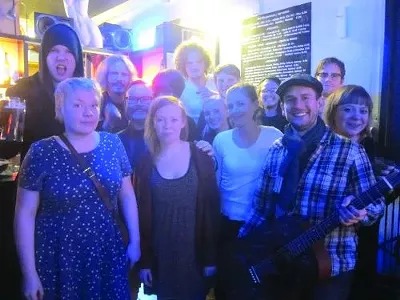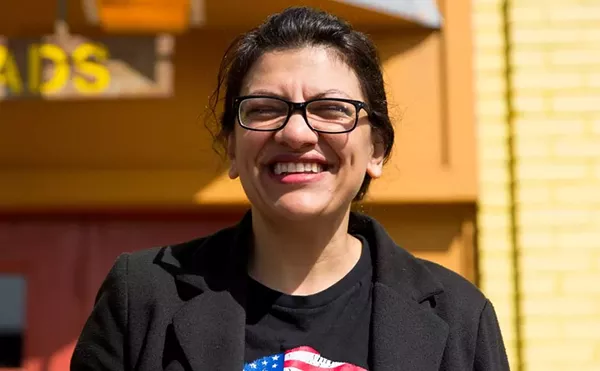Some seeds take longer than others to germinate.
The ones that grew into the Jimmy & Grace Lee Boggs School, a charter school that will open its doors on Detroit’s east side in September, were planted more than 20 years ago.
In 1992, at the age of 16, Julia Putnam became the first person to volunteer for what was then the newly formed Detroit Summer. A native of the city, she participated in the community group for the next five years, planting community gardens, painting murals and learning about the community activism that’s at the heart of this program, which attracted young people from around the country.
“One of the things about Detroit Summer,” she says, “is that it was the first time anyone asked me to exhibit the best part of myself, the part of me that wanted to make a difference. It’s where I learned how powerful it is to be of use to your community, and how important it is to young people to have adults honor and encourage that.”
After graduating from Michigan State University, she taught at Detroit middle schools, both public and charter, for five years. But she didn’t find the experience of teaching in traditional schools as fulfilling as she expected it to be.
“After teaching for about two or three years,” she says, “I was feeling dissatisfied with the profession. So I went to Grace [Boggs] and asked her advice.”
Boggs, a political philosopher and community activist, is one of Detroit Summer’s founders. What she helped Putnam realize was that it was the system of public education itself that left her wanting more.
So Putnam began meeting regularly with others at the nonprofit Boggs Center to discuss alternatives. Those conversations led to a decision by Putnam and others to open a school of their own.
“Five of us began planning a school that would be based on the values of Jimmy and Grace,” Putnam says. “We all agreed that the purpose of the school should be about building community.”
At its core, Putnam says, is a philosophical question: “What kind of people do we want our students to be on graduation day?”
In trying to answer that question, the organizers came up with a list of things all those involved agreed should be part of the school’s objectives.
“What we decided was that we didn’t want to teach just academic skills,” Putnam says. “We also wanted them to learn how to fix things, how to create things, how to love one another and how to be loved.”
And all would be done within the context of maintaining an intense focus on community.
Asked to provide an example of how that might work, Putnam responds by talking about the formula to determine volume.
In a traditional school, she says, students learn the formula — such as Length x Width x Height — do practice problems and then get tested.
In the kind of school Putnam envisions, the students would go to a garden bed, take measurements and then calculate how much soil will be required to fill it.
Lessons learned from just a book can easily be forgotten if the relevance isn’t readily apparent, Putnam says. But by taking that same formula and putting it to practical use, and accomplishing something immediately tangible, students are able to grasp why something is important, and will be more likely to retain the information.
The goal isn’t to produce kids who learn by rote what’s needed to succeed on standardized tests, but rather to nurture “creative, critical thinkers who will want to contribute to the well-being of their communities.”
By creating a school that’s fully integrated with the surrounding community, the hope is that the students attending it will see a future for themselves in Detroit.
Balance is Part of the Key.
“You don’t have to sacrifice academic rigor for community involvement,” Putnam says. “Our school is attempting to do both. If a student ends up going to Princeton or opening a plumbing business in their neighborhood, in our eyes both will be successful.
“The problem now is that so many young people think that success means being able to get out of Detroit. Part of what we want to do is redefine what it means to be successful.”
Also important is the idea of using the community’s “elders” to teach extracurricular courses, such as African drumming, to strengthen the bonds between students and the surrounding community.
Although unique to Detroit, the Boggs School won’t be treading on untested ground. The Mission Hill School in Boston is one example where a similar approach to teaching — known as “place-based education” — has proved successful, says Putnam.
Getting to this point hasn’t been easy. First was the decision of whether to work within the existing Detroit Public Schools system or go the charter route.
Initially, there was a fair amount of what Putnam describes as “pushback” from community members opposed to opening the school as a charter. From their perspective, charters are partly to blame for the crisis facing DPS by taking students — and the state money that accompanies them — out of the system.
But as they kept talking, and exploring the need to create a school completely different from any already existing in the city, the eventual conclusion was that it would have to be done as a charter.
In addition to public funding, the school has received a grant from the Kellogg Foundation and other private financiers.
When it opens in September, the school, which is located near Mack and McDougall, will offer classes from kindergarten through fourth grade. As students age, additional grade levels will be added. The goal is to eventually have the school teach kids K-12.
The vision is a big one. But learning to aim high is one of the things Putnam says she learned from Grace Boggs.
“What Grace told us,” Putnam says, “is that we must think beyond what we believe is even possible.”
To learn more about the Boggs School go to boggsschool.org or phone Julia Putnam at 313-655-2665.
Curt Guyette is Metro Times news editor. Contact him at 313-202-8004 or [email protected].






